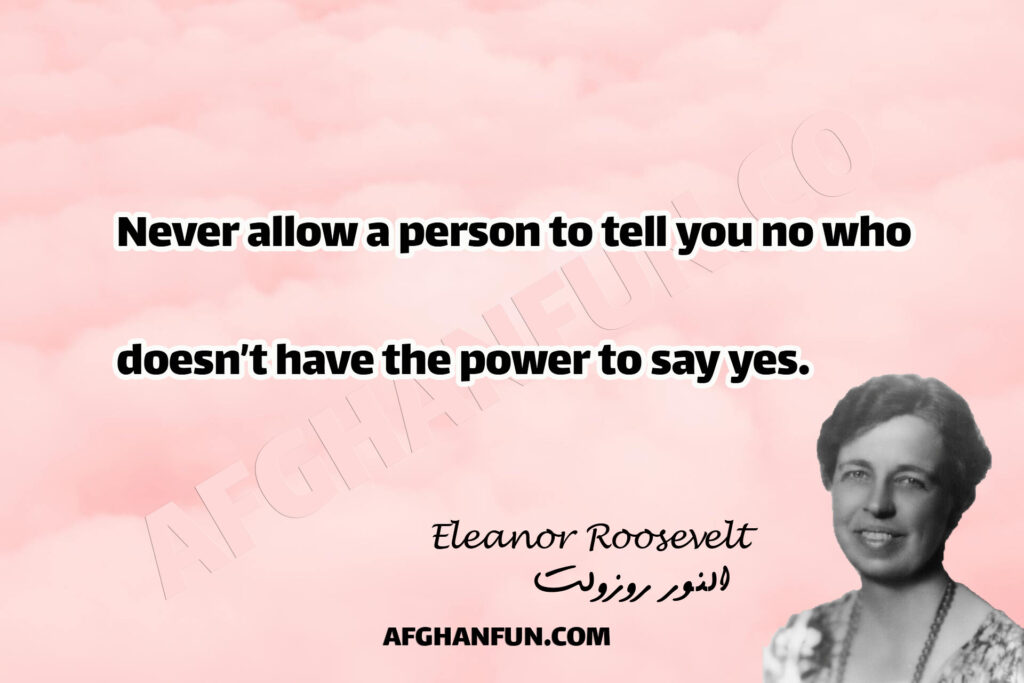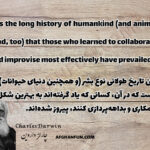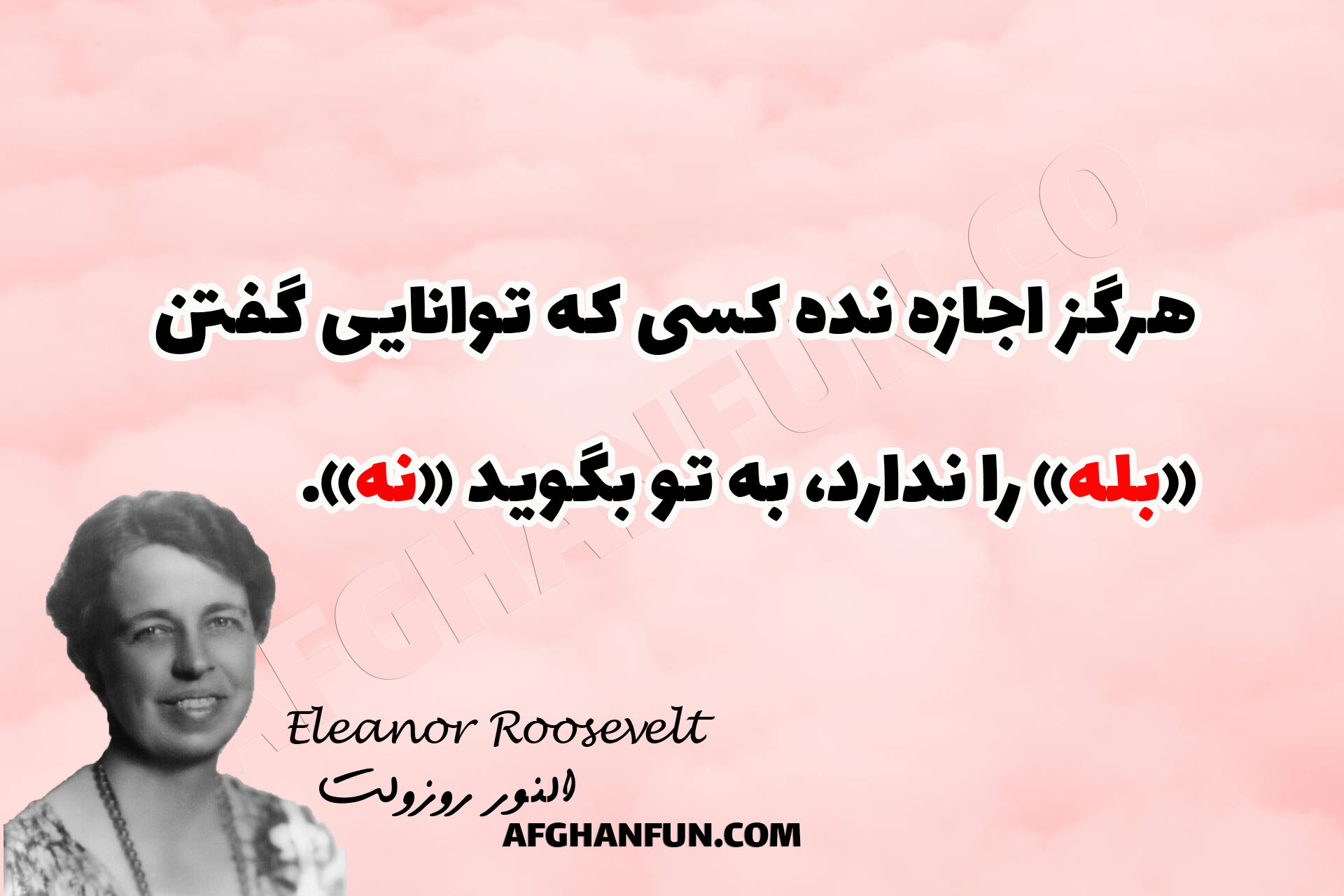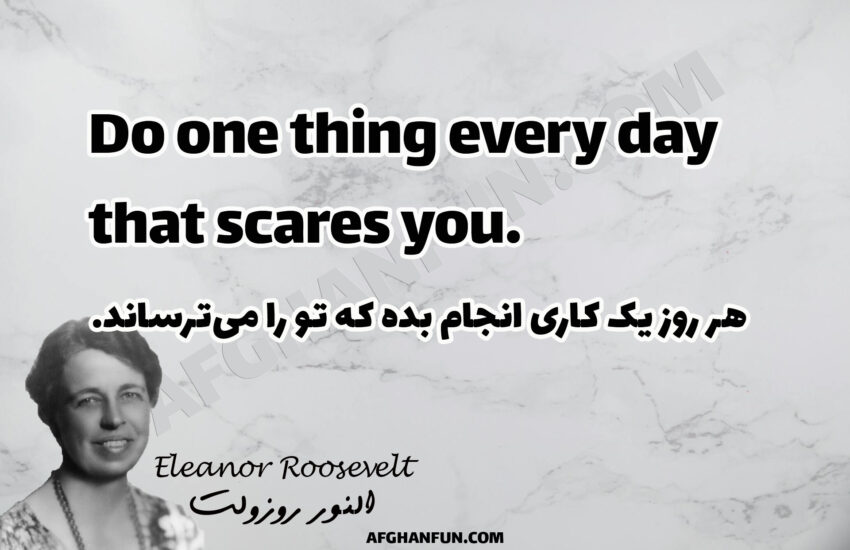
Never allow a person to tell you no who doesn’t have the power to say yes.
Eleanor Roosevelt
Ҳеҷ гоҳ нагузор, ки одаме ба ту гӯяд ‘не’, агар ӯ қудрати гуфтан ‘ҳа’ дошта бошад.
Элеонора Рузвелт
Ин ибора ба мо мегӯяд, ки набояд ба назарҳо ва маҳдудиятҳое ки дигарон барои мо муайян мекунанд, хусусан вақте ки худашон қобилияти анҷом додани корро надоранд, таваҷҷӯҳ кунем. Ин ибора, моро ба боварӣ ба худ ва қобилиятҳои мо ташвиқ мекунад ва ба мо ёдрас мекунад, ки маҳдудиятҳо аксар вақт дар зеҳни мо сохта мешаванд.
هرگز اجازه نده کسی که توانایی گفتن «بله» را ندارد، به تو بگوید «نه».
النور روزولت
این جمله به ما میگوید که نباید اجازه دهیم دیگران، به خصوص کسانی که خودشان قدرت تصمیمگیری یا انجام کاری را ندارند، به ما بگویند که نمیتوانیم به اهدافمان برسیم. این نقل قول، ما را به اعتماد به خود و تواناییهایمان تشویق میکند و به ما یادآوری میکند که محدودیتها اغلب در ذهن ما ساخته میشوند.
لا تدع شخصاً يخبرك بـ ‘لا’ وهو ليس لديه القدرة على قول ‘نعم’.
إليانور روزفلت
هذه العبارة القوية والملهمة تذكرنا بأن لا نولي اهتمامًا لآراء وتقييدات الآخرين لنا، خاصة عندما لا يمتلكون أنفسهم القدرة على فعل شيء ما. تشجعنا هذه العبارة على الثقة بأنفسنا وقدراتنا وتذكرنا أن الحدود غالبًا ما تكون من صنع عقولنا.
This quote speaks to the idea of not letting individuals who lack authority or influence hold you back, especially when their ability to say “no” is disproportionate to their ability to offer support or approval.
Here’s a deeper analysis:
1. Empowerment and Agency:
The quote emphasizes the importance of recognizing where true power lies. If someone lacks the ability to say “yes” (i.e., to approve, support, or allow), their “no” shouldn’t carry the same weight. It encourages the individual to understand their own power and not to be deterred by people who don’t have the authority or capacity to help them move forward.
Personal agency is a key theme here. You should never let someone else’s limited perspective or control over a small aspect of your life prevent you from reaching your full potential, especially if that person doesn’t have the power to positively influence your goals or vision.
2. Rejection and Limits of Influence:
The idea of saying “no” often represents rejection or limitation, but not all rejections are equal. If a person cannot say “yes,” then they don’t have the capacity to enable your growth or success, so their “no” is less relevant. This calls attention to the asymmetry of power—sometimes people impose barriers that they don’t have the authority to enforce.
This line is also a caution against taking rejection too seriously, especially when it comes from someone who isn’t in a position to grant you the opportunities you’re seeking.
3. Self-Confidence and Standing Firm:
Implicitly, the quote promotes self-confidence and encourages individuals to trust their own judgment rather than being swayed by others who may not understand or support their aspirations. It suggests that we shouldn’t allow the opinions or refusals of people who lack insight or authority to derail our progress.
4. Contextual and Situational Power:
Power is context-dependent. In a corporate setting, for instance, you may encounter people who are limited by their roles (such as subordinates or peers), but who try to assert authority or influence over you. If these individuals lack decision-making power, their “no” is less significant in the grand scheme of things.
Similarly, in social or personal relationships, the quote suggests not letting people who don’t have a clear stake in your decisions or life choices impose their limits on you.
5. Encouraging Independence:
The quote subtly encourages independence and resilience. It’s a reminder that external setbacks or voices of doubt should not dictate the course of your life if those voices don’t have the necessary authority to affect change.
By reminding us not to listen to people who lack the ability to offer positive alternatives (“yes”), the quote encourages individuals to rely more on their own judgment, to seek out those who are genuinely able to help, and to avoid becoming discouraged by negativity.
6. Practical Application:
In a practical sense, this advice can apply to various areas of life: from career to personal relationships to creative pursuits. For instance, in the business world, this could mean not being deterred by someone who doesn’t have decision-making authority but who might still attempt to block your path. In relationships, it could refer to not allowing someone’s lack of support or encouragement to prevent you from pursuing what truly matters to you.
Conclusion:
In essence, this quote reminds us that we shouldn’t be deterred by negative voices that don’t have the ability to actually affect our outcomes. It’s about recognizing where true power lies, and not letting those without genuine influence prevent us from achieving our goals. It promotes self-reliance, resilience, and confidence in pursuing one’s dreams, regardless of who may try to tell you “no.”
Eleanor Roosevelt (born October 11, 1884 – November 7, 1962) was a pioneering figure in American history, known for her work as a First Lady, diplomat, and human rights advocate. Here’s an overview of her life and legacy:
Early Life and Background:
- Born in New York City into a prominent family, Eleanor Roosevelt was the niece of Theodore Roosevelt, the 26th President of the United States.
- She had a challenging childhood, marked by the early deaths of both her parents (her mother in 1892 and her father in 1894), which left her emotionally scarred. She was raised by her maternal grandmother and was largely isolated and introverted during her youth.
- Eleanor attended Allenswood Academy in London, where she thrived academically and developed a strong sense of independence.
Marriage to Franklin D. Roosevelt:
- In 1905, she married her distant cousin, Franklin D. Roosevelt, who later became the 32nd President of the United States.
- The Roosevelts had six children, though their marriage was complicated. Franklin contracted polio in 1921, and Eleanor became increasingly independent, taking on a larger public role.
- Eleanor’s relationship with Franklin was both a partnership and a challenge. While Franklin had a number of infidelities, Eleanor found her own path through public service and social activism.
Role as First Lady (1933-1945):
- When Franklin became president in 1933, Eleanor redefined the role of First Lady. She was far more active and outspoken than her predecessors, choosing not to be a passive observer of her husband’s political career.
- She used her position to champion civil rights, women’s rights, and labor rights, advocating for the poor and marginalized during the Great Depression.
- Eleanor gave regular press conferences and wrote a popular newspaper column, “My Day”, which addressed a wide range of topics, from politics to social issues.
- She was an advocate for New Deal programs that provided aid to struggling Americans, particularly women and minorities.
Advocacy for Human Rights:
- Beyond her work as First Lady, Eleanor became a tireless advocate for human rights and social justice.
- In 1945, after Franklin’s death, she was appointed as a delegate to the United Nations General Assembly, where she became the first chairperson of the United Nations Commission on Human Rights.
- One of her most notable achievements in this role was her leadership in drafting and promoting the Universal Declaration of Human Rights in 1948. This declaration set out fundamental human rights that should be protected for all people, regardless of race, nationality, or religion.
Civil Rights and Social Justice:
- Eleanor was an outspoken advocate for racial equality, particularly during the civil rights struggles of the 1940s and 1950s.
- She supported anti-lynching legislation and took steps to challenge racial segregation in her public and private life.
- She worked closely with African American leaders like Mary McLeod Bethune and W.E.B. Du Bois and pushed for greater inclusion of African Americans in government and social programs.
- Despite facing criticism for her activism, particularly from Southern Democrats, Eleanor remained steadfast in her commitment to racial justice.
Later Life and Legacy:
- After leaving the role of First Lady, Eleanor continued her activism, focusing on human rights, civil rights, and promoting the welfare of women and children.
- She was a prolific author and speaker, writing numerous books, essays, and articles on topics ranging from politics to personal reflection.
- In 1961, Eleanor was appointed by President John F. Kennedy to the Presidential Commission on the Status of Women, which worked to address gender inequality.
- Eleanor Roosevelt passed away on November 7, 1962, at the age of 78. She is remembered as one of the most influential women in American history and a global symbol of compassion, determination, and commitment to human dignity.
Key Contributions:
- Human Rights Advocacy: Instrumental in drafting the Universal Declaration of Human Rights.
- First Lady of Action: Redefined the role of First Lady with her activism and public engagement.
- Civil Rights Champion: Fought against racial discrimination and advocated for the rights of African Americans.
- Women’s Rights: Focused on gender equality and worked to improve women’s social, economic, and political standing.
- Social Justice: Championed the rights of the poor, the oppressed, and marginalized communities.
Quotes:
- “The future belongs to those who believe in the beauty of their dreams.”
- “You must do the thing you think you cannot do.”
- “It is not fair to ask of others what you are not willing to do yourself.”
Eleanor Roosevelt’s legacy is far-reaching. She was not only a political figure but also a deeply compassionate individual who reshaped the role of women in public life and left an indelible mark on the global human rights movement. Her work continues to inspire movements for equality and justice around the world.











